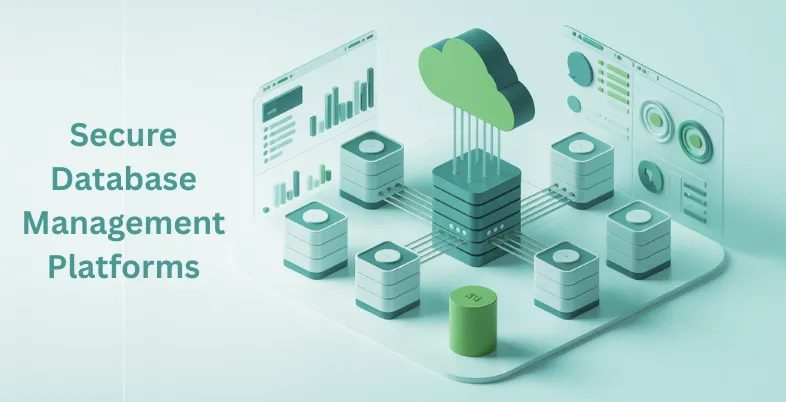For the first time in history, a renewable energy revolution has emerged in India, which has offered a lot of entrepreneurs the opportunity to start profitable businesses in solar. Through the ambitious 500 GW target set by the government in the true approach of the renewable energy market, as well as the growing level of awareness on climate change issues, the solar industry has emerged as one of the most profitable ventures to invest in.
The solar power business is growing at an impressive rate, and the industry is currently worth more than 2.4 lakh crore. It is projected to grow at least up to 2025, making India one of the largest markets of solar energy in the world. The opportunities of these Solar Business Ideas are varied and may prefer small-scale set-ups or large-scale manufacturing initiatives, which makes it viable enough for entrepreneurs who have different investment skills and technical abilities.
Overview of the Solar Power Industry in India
India’s solar power sector has experienced remarkable growth, positioning the nation as a global leader in renewable energy. In 2024, India added approximately 24.5 GW of solar capacity, marking a significant increase from previous years.
- Market Size and Growth: The Indian solar energy market was valued at approximately $45 billion in 2024 and is projected to reach $125.4 billion by 2033, growing at a compound annual growth rate (CAGR) of 41.5%.
- Corporate Investments: Major corporations are making substantial investments in India’s solar infrastructure. Tata Power Renewable Energy Limited (TPREL) has committed to investing INR 70,000 crore (approximately $8.5 billion) over the next 5 to 7 years to develop 10 GW of solar and wind energy projects in Tamil Nadu.
- Government Initiatives: The Indian government continues to support the solar sector through various policies and schemes. Programs like the PM KUSUM (Kisan Urja Suraksha Evam Utthaan Mahabhiyan) and the National Solar Mission aim to promote solar energy adoption across the country.
- Global Recognition: India’s commitment to renewable energy has garnered international attention. The country is recognised as the third-largest solar market globally, with projections indicating continued growth in the coming years.
Why the Solar Business is Considered Profitable
- Large Profit Margins: With the ability to benefit through buying in large quantities and operating leanly, solar franchises in India have gross margins of profits ranging between 15-25.
- Expanding Market Demand: The rising costs of electricity and environmental awareness make a steady demand for solar power in homes, commercial, and industrial areas.
- Government Support: The start-up barriers are minimised by means of massive subsidies, tax subsidies, and policy provisions under programmes such as PM Surya Ghar Yojana.
- Low Operating Costs: Solar systems may be installed and modified after installation with little maintenance needed, and this guarantees continued profitability as it has recurring revenue due to AMCs and service contracts.
- Fast payback period: The majority of partners are able to break even in 3 to 6 months of active selling, and thus, it is a good investment opportunity.
- Scalable Business Model: Solar Power Business Ideas can be expanded from a small local operation to a large regional distributorship, depending on the power of investment.
Top 15 Solar Business Ideas in India
1. Rooftop Solar Panel Installation
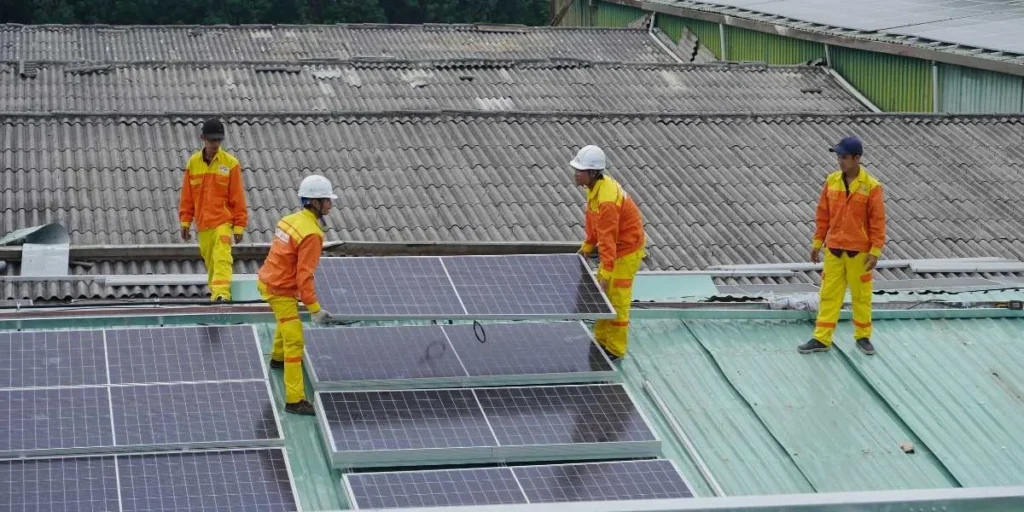
Rooftop solar installation is one of the most promising Solar Business Ideas in the renewable energy sector. It is the business idea of Solar Power that is the most lucrative and easiest for an aspiring entrepreneur. The company plans, installs, and maintains the solar panel systems on the roofs of homes and offices. Rooftop solar is extremely popular among residents and commercial users in the country, as with a growing number of electricity-cities across India and increased electricity costs, our option allows them to conserve on their expenses.
It is good in margins and requires less start-up fund compared to other solar businesses. Installation involved in the work includes the roof measurement, the system design, part procurement, panel installation, their startup, and after-sales assistance.
- Investment & Cost: Depending on the size of their operation, it will cost as little as 5lakhrupees or even five crores.
- Profitability & ROI: A 3kW residential rooftop solar facility yields approximately 160,000n 180000n per job.
- How to Start: Obtaining the necessary permits, collaborating with the manufacturers of solar panels, and employing a qualified team of installers.
Also Read: Agriculture Business Ideas
2. Solar EPC (Engineering, Procurement & Construction) Services

Solar EPC services provide end-to-end project management services to large-scale solar facilities. It is a lucrative concept for trained entrepreneurs. The job includes taking care of things as simple as making sure that a site is appropriate and as complex as switching on the plant. EPC contractors plan, procure, and deliver all equipment and construct and deliver a complete plant to the customers.
The job requires technical expertise and high start-up funding, but it is good compensation when applied to big projects. Mega solar projects rely on EPCs, which contribute to long-term relationships with companies and governments.
- Investment & Cost: the price of a 1 MW plant as of 2008 is approximately 4 crore in gear and installation.
- Profitability & ROI: A 5MW plant will generate a profit of 1.5-1.75 crore a year, and after 7- 10 years, you would have recovered the money you invested.
- How to Start: EPC licensing, creating a technical team, getting suppliers, and targeting industrial clients.
3. Solar Panel Manufacturing & Distribution
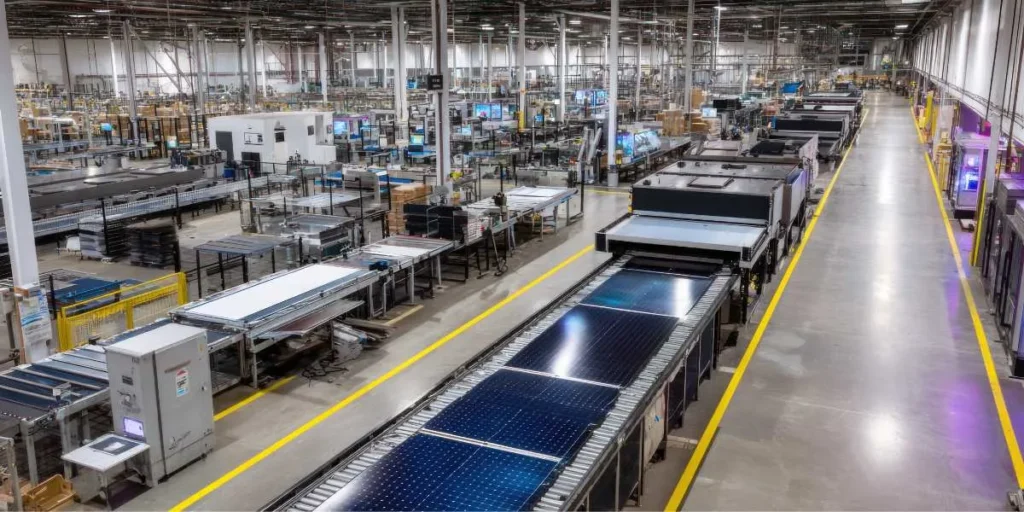
The manufacturing and distribution of solar panels form the basis of Solar Business Ideas in India. It is a rewarding, as well as capital-intensive idea. You can even establish a factory to produce panels and parts, or you can set up a network that will distribute finished products. Establishing a factory requires a high amount of investment in machinery and skilled labour, but yields well in the long term.
The distribution business will require less capital and aims at creating installer and store supply chains. Both have the advantage of the Make in India initiative and import reduction policies that promote local products.
- Investment & Cost: 50-100 crore for a factory. The requirement of a distributor is 10-50 Lakh based on the scale of the area.
- Profitability & ROI :ROI Factory makers make 20 -30 per cent gross. Distributors make 815/profit when the stock is turned over.
- How to Start: In the case of a factory, one needs to buy land, industrial permits, and production equipment.
4. Solar Lighting Solutions
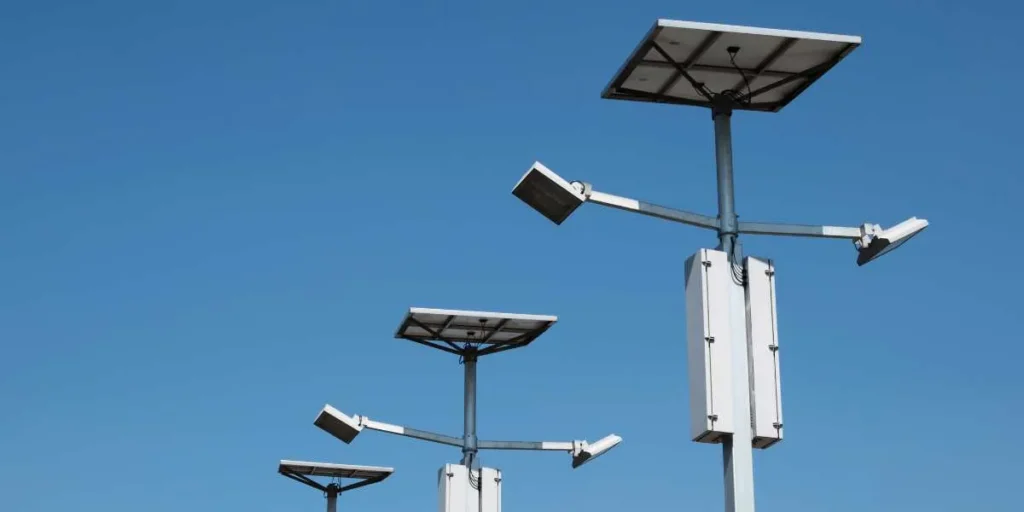
Solar lighting is an up-and-coming product that addresses the broad lighting requirement of cities and villages in India. The company produces, markets, and installs solar street lights, garden lights, house lights and decorative light fixtures. There are government lighting contracts and sales to homes and offices in the market. The solar lights are being widely used in rural regions where there is either grid power or weak power. Repeat maintenance contracts, and part replacement make the business expand well enough.
- Investment & Cost: The trading begins with 2-10 lakh. Manufacturing needs ₹20–50 lakhs.
- Profitability & ROI: Gross profit 25-40 and seasonal peaks.
- How to Start: Find good stuff to make, obtain necessary qualifications and sell to business and consumer markets.
5. Solar Water Heaters & Pumps

Solar pumps and water heaters would satisfy basic needs, making them a feasible Solar Business Idea. This segment produces, markets, and installs solar water heaters for homes and institutions, and solar water pumps for farms and industries. In cities, solar heaters are on the rise since LPG rates are very high, and individuals are increasingly concerned with ecology. Farmers grow crops with the assistance of solar pumps without relying on the grid. The company benefits from stable demand and favourable government support in terms of subsidies.
- Investment & Cost: A trading business requires an investment of ₹5k-15lakhs. A factory needs ₹25–75 lakhs.
- Profitability & ROI: Heaters have a 30-35 per cent margin. Pumps are getting a 2045 margin and provide annual maintenance services.
- How to Start: Find Famous Makers, Approval of BIS, and Gain an installation and service network.
6. Solar Power Franchise Opportunities
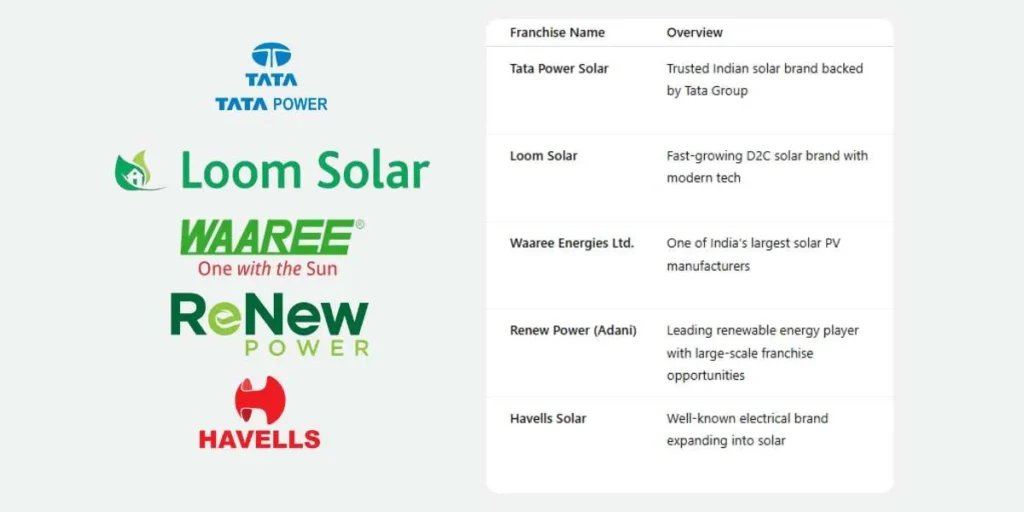
Solar franchise is an excellent opportunity to get into renewable energy for a start-up entrepreneur. They employ established business strategies, brand name, technological assistants and marketing. Large-scale solar enterprises offer complete packages: their products, training, marketing support and continuous guidance. The small dealerships can be very inexpensive in franchising, or may be large master franchises that cover large regions. This reduces the chances of having to start afresh and accesses predefined supply lines and customers.
- Investment & Cost: You require around 5 lakh and two crore. Franchise fees start at Rs. 20,000.
- Profitability & ROI: The good profit margins incurred by the owners can amount to 1 lakh a month.
- How to Start: Find the good solar companies, check the terms of the franchise, fill out the application and attach all necessary documents.
7. Solar Energy Consultancy
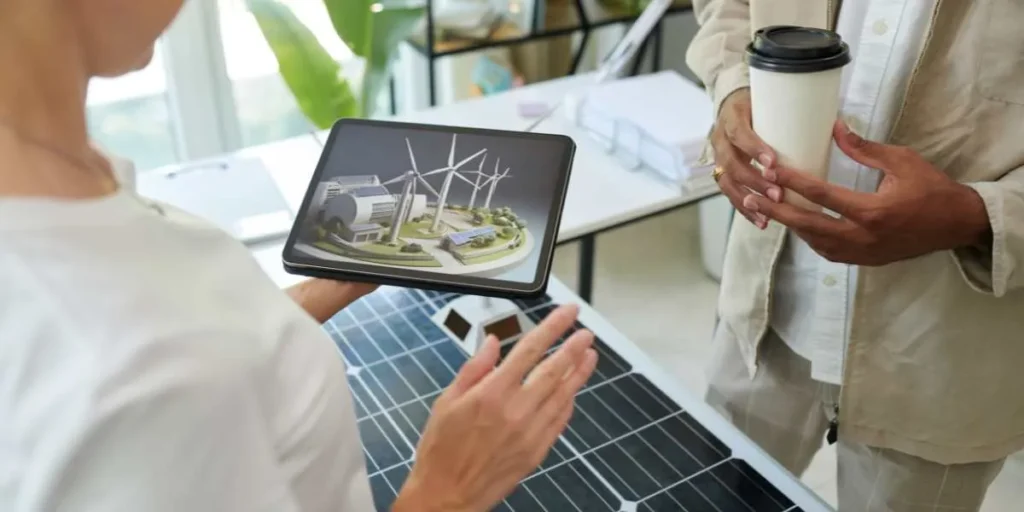
A solar consulting firm provides consultancy and technical support to clients. The tasks involve the studies, designing, project management, legal documentation, and inspections. Consultants will assist homes, businesses, and factory buildings to have the most appropriate solar system and comply with all regulations. Space in the office is minimised, but it requires good technical proficiency. Consultants are more resourceful as the solar projects become intricate.
- Investment & Cost: The start-up investment is minimal- Rs. 2- 5 lakh, of which is on office, certificates, and marketing.
- Profitability & ROI: Services are half-two thirds 40-60 profitable and able to cause repeat business.
- How to Start: Obtaining the appropriate certificates, developing the technical experience and presenting the projects that were done successfully before.
8. Mini Solar Plants

Mini plants are small to medium-scale solar production facilities (100 kW to 5 MW) and represent a promising Solar Business Idea. These plants either sell power or serve it to local industries and are constructed on leased or owned land. Some of the work involved includes site selection, approvals and funding, construction, and operation of the plant. They receive good returns with the support of government tariffs and buy-back regulations. Mini plants also serve as a stepping stone to larger solar undertakings.
- Investment & Cost: Spend Rs. 40-50 lakhMW on land, equipment and construction.
- Profitability & ROI: Get a consistent annual income that is a 7-10 year payback.
- How to Start: locate and look after the state electricity commission approval and venture capital.
9. Solar Chargers & Portable Solar Products

The portable solar chargers and products satisfy the requirements of the mobile and outdoor customers. Products: these include power stations, phone chargers, camping products, emergency lights, and power banks. Promotes the product via online shops, retail outlets, and direct sales. These products are well-regarded in terms of their margins; they sell fast and can be reminded about new technology. The increase in the population of people who own phones and are interested in renewable energy increases the market.
- Investment & Cost: Operate a trade business directly with a 3-8 lakh; need 10-25 lakh to make a private label product.
- Profitability & ROI: Margins are 35-50 and inventory can be solved quickly on the Internet.
- How to Start:Buy online stores, create an online website and serve tech-savvy consumers with online commercials.
10. Hybrid Renewable Energy Solutions

Hybrid systems combine solar power with wind energy or batteries to provide stable power, making them an innovative Solar Business Idea. They address the deficiencies of solar by integrating alternative forms of energy. Hybrids are also suitable for remote locations, factories, or areas with unreliable grid power. The creative aspect of this business lies in designing the system, integrating technologies, and implementing advanced controls. These systems are more effective and reliable compared to standalone solar solutions, and their demand is steadily increasing.
- Investment & Cost: Trading requires 15-30 lakh; an integrated structure requires 50 lakh-2 crore to build.
- Profitability & ROI: high premium prices, 25-35 variety profit generation, making technology advanced.
- How to Start: Understand some of the renewable technologies, obtain certifications and reach out to the industrial customers.
11. Solar Inverters & Batteries Retail
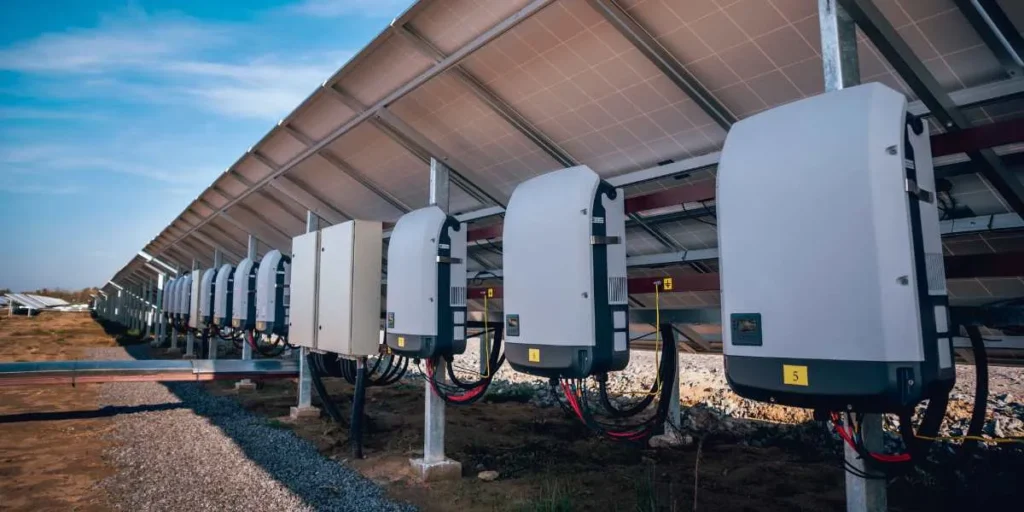
It is necessary to sell solar inverters, charge controllers, batteries, and other electronics. These components are changed or updated frequently, providing stable sales. Retail holds DIY customers and professional installers of solar systems. Battery technology is moving to lithium-ion, and inverters currently have smart technology with the ability to interface to grids, exposing premium markets.
- Investment & Cost: Develop a retail outlet using concepts of Rs. 5-15 lakh will get shop and stock.
- Profitability & ROI: The profit offered: 15-20 per cent on one occasion, 20-25 per cent with a resale basis on the batteries.
- How to Start: Cooperate with reputable manufacturers, open a boutique, and provide customers with technical assistance.
12. Solar-Powered Street Lighting

Solar street lights are a practical Solar Business Idea that helps save on electricity bills while reducing carbon emissions, and they can illuminate areas with weak or unreliable grids. The business involves the fabrication, distribution, and installation of these lights in urban contracts, small towns, residential colonies, and factory locations. Renewable street lighting is supported under government policies, providing numerous opportunities for both small entrepreneurs and large companies through contracts. The business can focus on supplying products or handling complete project execution.
- Investment & Cost: Trade requires 8- 20 lakh; construction of factories requires 30- 80 lakh.
- Profitability & ROI: 20-30 component profit, particularly using large government contracts.
- How to Start: Obtaining approvals of the products, registering of government tenders, and developing a team to deliver projects.
13. Solar Cold Storage Solutions
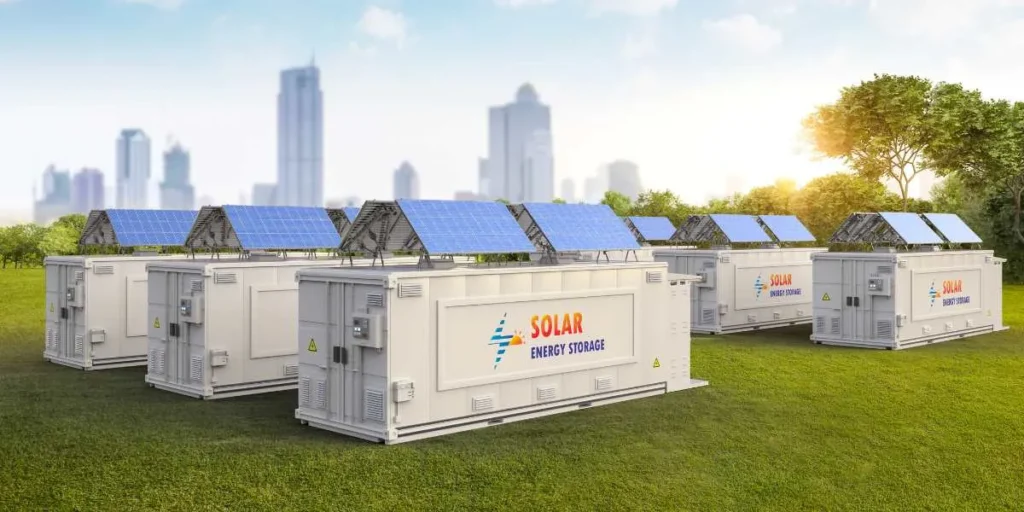
Solar cold storage systems assist farmers and food processors with maintaining the coolness of food with the assistance of solar power. They save post-harvest losses, allow farmers to maintain longer holding times of higher-valued produce, and store medicines at low temperatures in areas with inaccessible, unreliable electricity. The concept combines solar energy experience with the knowledge about refrigerators. It is a good investment that benefits people as the government programs support the cold chain build-outs.
- Investment & Cost: The small units cost approximately 15 lakh- 5 lakh or so. The estimates required in large commercial units would be ₹50 lakh to ₹2 crore.
- Profitability & ROI: The company will be able to achieve 3040 per cent profit margins by providing constant maintenance agreements or energy savings to customers.
- How to Start: Study the proper operation of refrigerators, collaborate with equipment manufacturers and target farmers and food markets.
How to Start a Solar Energy / Solar Panel Business: Step-By-Step Guide
- Step 1: Market Research & Planning: Study local demand, competitors, pricing, and government policies. Create a solid business plan with services, investment, and financial forecasts.
- Step 2: Choose a Business Model: Pick from installation, distribution, manufacturing, consultancy, or franchise based on your budget, skills, and market potential.
- Step 3: Legal Compliance: Register your business, get required licenses (e.g., electrical contractor), GST, trade licenses, and environmental clearances.
- Step 4: Financing: Use savings, bank loans, government schemes, or investors. Identify subsidies and prepare financial projections.
- Step 5: Build Technical Skills: Hire or train technicians. Get certified in solar system design, installation, and safety.
- Step 6: Secure Suppliers: Partner with reliable solar panel, inverter, and component suppliers. Negotiate bulk deals and diversify supply sources.
- Step 7: Set Up Infrastructure: Arrange office, warehouse, and service centre. Invest in tools, vehicles, and showroom setups.
- Step 8: Marketing & Customer Acquisition: Create marketing campaigns, build an online presence, join trade shows, and connect with architects and contractors.
- Step 9: Quality & After-Sales: Ensure product and installation quality. Provide support, warranties, and maintenance to build trust.
- Step 10: Monitor & Scale: Track key metrics (installations, profits, customer base). Expand services or locations as performance grows.
What is the Cost of a Solar Power Franchise?
- Initial Investment Range: Depending on the size of the territory and the level of franchise, the investments in the franchises are -2 crores to 5 lakhs.
- Franchise Fee Structure: The initial franchise fees, at any given time, are between 20,000 to 2 lakhs of rupees and a master franchise is paid a higher fee.
- Infrastructure Requirements: Other expenses are an office space, showroom set-up, a warehouse facility, and vehicles, which usually cost around 2-5 lakhs to invest.
- Working Capital Requirement: Inventory and operations would demand Rs. 3-10 lakhs as per the volume of business and terms of payments to their suppliers.
- Training and Certification Cost: yearly technical training and certification programs, plus continual education, usually range from Rs. 25,000 -1lakh.
- Marketing and Promotion Investment: The marketing support of the franchises and local promotional expenditure will need an annual allocation to Russia of 1-3 lakhs so that the brand is known to the locals.
Benefits of Joining a Solar Franchise vs Starting Independently
- Brand Recognition and Trust: Built In Trust customer trust and immediate brand credibility is guaranteed by established franchises, eliminating marketing efforts and customer acquisition expenses.
- Technical Training and Support: In-depth technical training, installation steps, as well as continued support, would result in a quality delivery of services, minimisation of the technical learning curve of the entrepreneur new to the company.
- Established Supply Chain: The availability of bulk procurement rates, trusted and unbroken supplier chains and reduced logistics minimises the complexities of operations and enhances profitability.
- Marketing and Lead generation: Professional marketing documents, online campaigns and lead generation strategies generate a constant stream of customers without having to incur heavy expenditure on marketing the products and services.
- Business Process Guidance: The established business processes, operations, and appropriate management systems will minimise trial and error costs and allow businesses to develop faster and increase profitability.
- Continual Support and Updates: periodic updates of training, customer support, new product introduction, and assistance in business development will take care of competitive advantage and business sustainability.
Conclusion
The solar energy market has never offered as great opportunities as it does currently to the entrepreneurs who want to have profitable and sustainable business ventures in the Indian goods market, where the activities of the renewable energy segment are booming. Offering an array of Solar Power Business Ideas, including both small-scale installations and large manufacturing plants, a variety of professional choices can be offered to entrepreneurs according to their ability to invest or not.
Solar expansion potential is enormous, in urban rooftops and country farms, with the potential of firms such as Solar Ace Energy serving to power 150+ channel associates in 100+ cities of India. The business environment is favourable because of government aid in terms of subsidies, desirable policies, and set targets in terms of renewable energy. The key tasks that need to be attended to in solar business development are proper planning, technical skills, quality orientation, and the interests of the customers.
The fast development pace of the industry, environmental gains, and high profitability make Solar Power Business Ideas desirable business development projects to be undertaken by foresightful entrepreneurs eager to play their role in the transformation of clean energy in India.
FAQs
How much will a solar company need to invest to establish a business in India?
Minimal investment depends primarily on the type of business and the limits of investments start as RS.. 2-5lakh on consultancy business or small trading business, and up to 50lakh- 2 crore on manufacturing business.
The time taken to break even in the solar business.
The break-even period can be gained by Universal Solar Commercial Associates in 3 to 6 months after active selling; however, this is a variable of business and market conditions.
Am I required to have some technical knowledge to begin with the solar business?
Technical knowledge assists, though there are numerous examples of successful entrepreneurs that have their initial rudimentary knowledge and enhanced experience acquired during the training courses that manufacturers providing the franchises can offer and with the help of franch(‘es)e assistants.
Is there any government aid for solar businesses?
The government, by way of subsidies, tax benefits, first priority sector lending, and programs through PM Surya Ghar Yojana, subsidizes solar business as well as the end customer.
Does solar business make sense in the countryside regions?
Yes, rural locations have high opportunities, as the grid connectivity is poor, agriculture is used, and the government is under stress to provide rural areas with electricity because of renewable energy.


